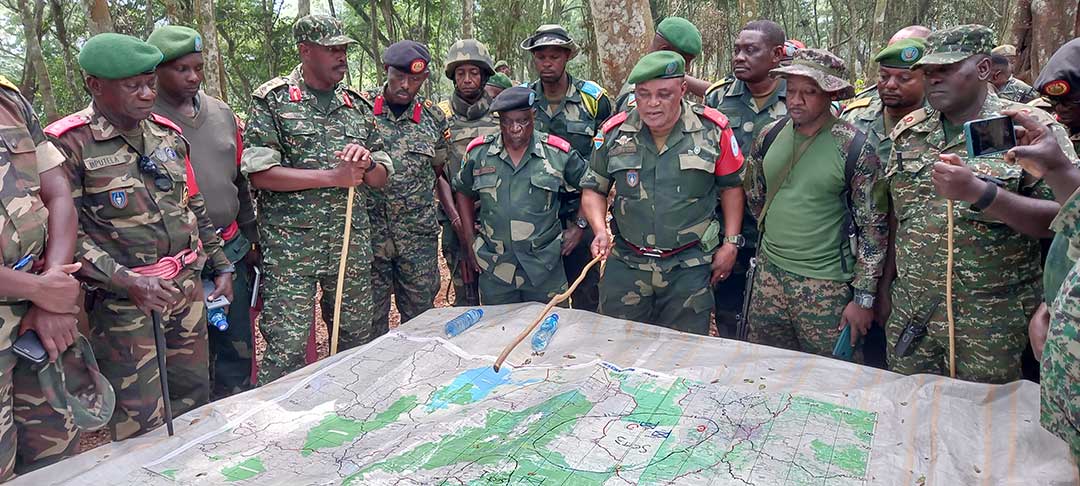Uganda, DRC Join Forces to Remove Rebel Group
ADF STAFF
For several years, Uganda has offered to help its neighbor, the Democratic Republic of the Congo (DRC), fight a bloodthirsty band of Islamist militants based in its restive northeast region.
The group, known as the Allied Democratic Forces, has terrorized the DRC’s North Kivu and Ituri provinces for decades but recently turned its attention to Uganda with a spate of bombings.
The most brazen attack in Uganda saw three suicide bombers trigger large explosions in downtown Kampala on November 16, killing at least four people and injuring dozens.
But the shockwaves of that attack could lead to the Allied Democratic Forces’ undoing because it prompted the Uganda People’s Defence Force (UPDF) and the Armed Forces of the DRC (FARDC) to work together.
“When the neighbor’s house is burning you have to rush to help,” Ugandan minister of defense Vincent Bamulangaki told The East African newspaper. “We came here because we are meeting as brothers who have a common future.”
The Allied Democratic Forces formed in Uganda in the 1990s and was thought to be a collection of rebel factions and warlords with little ideology. In 2007, the UPDF pushed the group out of Uganda and into the DRC, where it has killed thousands of civilians since.
After 11 years of relative calm along its western border, Uganda found itself in the crosshairs of the Allied Democratic Forces beginning in June 2021 with support from Islamic State-linked terrorists.
Ten days after the Kampala bombings, Congolese President Félix Tshisekedi reportedly gave permission to Ugandan President Yoweri Museveni to send troops.
Beginning November 30, a wave of air and artillery strikes on suspected rebel bases in the forests of eastern DRC preceded “search and control” operations on the ground.
DRC government spokesperson Patrick Muyaya said UPDF and FARDC leaders had been exchanging intelligence months before the bombings brought the two forces together.
“We and Uganda have an obligation to act together,” he said in a December 1 news conference after at least 1,700 Ugandan Soldiers and dozens of armored vehicles had crossed the border.
The UPDF said the progress of the mission will be evaluated after two months.
“The duration of this operation will be determined by the military-strategic end state … to defeat the rebels and defeat their will to fight,” Ugandan Maj. Gen. Kayanja Muhanga said in a video on Twitter.
Mountainous terrain and impassable roads presented an early challenge for ground forces and vehicles to reach the militants’ remote camps. It forced the joint effort, called Operation Shujaa (hero in Swahili), to halt for a week, according to UPDF information officer Maj. Peter Mugisa.
Still, he said, the UPDF was able to establish a forward operating base at Mukakati, North Kivu, about 19 kilometers from the militants’ hideouts.
“We are going to bring in graders to open up the roads, but the combined fighting patrol force has started moving forward from Mukakati towards those known camps,” Mugisa said to reporters December 3.
UPDF spokeswoman Brig. Gen. Flavia Byekwaso acknowledged December 7 that neither country’s army had reached the rebel camps, making it nearly impossible to verify the effectiveness of the air and artillery strikes.
“We haven’t documented anything yet,” she told The Africa Report magazine.
On December 13, Byekwaso and her FARDC counterpart issued a joint statement that signaled a shift in strategy.
In conjunction with regular joint meetings to explain the military operation to the public and provide updates with transparency, they announced a program to win civilian support, which includes grading and surfacing hundreds of kilometers of roads in eastern DRC.
“In order to gain the loyalty of the population and reverse the harmful propaganda instilled by the [Allied Democratic Forces] and their allies, the FARDC and the UPDF have launched a vast awareness campaign and are carrying out civil-military actions, which are already bearing fruits,” they said in a statement.
While the two armies promised to coordinate their attacks and their communication, the joint statement also sought to give assurances that the now-formalized operation will respect international law and human rights, promising that the joint forces will target only the terrorist group’s camps.
Later that day in a state of the nation address, Tshisekedi echoed those assurances and summarized the mission.
“In order to fight them more effectively, our two countries have recently agreed to pool their efforts in order to carry out joint operations against this common enemy,” he said. “I will ensure that the presence of the Ugandan army on our soil is limited to the time strictly necessary for these operations.”


Comments are closed.